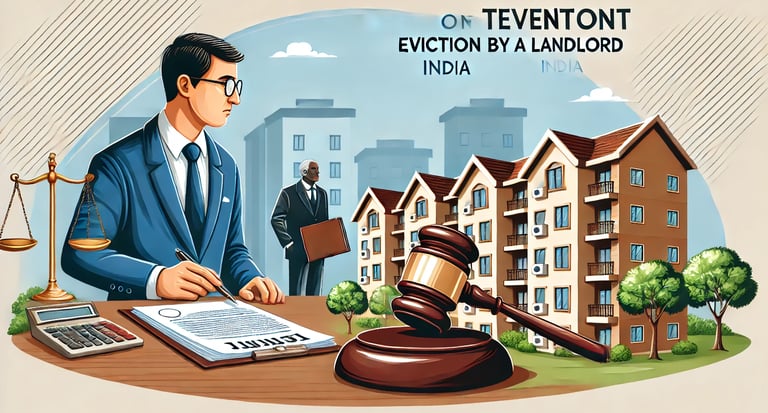Can a tenant defend eviction by the landlord
Can a tenant defend eviction by the landlord? Explore legal grounds, defenses, and procedural aspects of eviction cases in India to protect your rights as a tenant.
Archita
3/22/20254 min read


A man's home is his castle, but a tenant's rights are his fortress.
According to a 2022 report, nearly 30% of urban households in India live in rented accommodations. With the rising cost of real estate, renting has become a practical solution for many. However, the landlord-tenant relationship can sometimes be fraught with disputes, particularly when it comes to eviction. Can a tenant defend eviction by the landlord? What are the legal provisions that protect tenants in India? This article delves into these questions, providing a comprehensive guide for tenants facing eviction.
Introduction
Eviction is a legal process through which a landlord seeks to remove a tenant from the rented property. While landlords have the right to reclaim their property under certain conditions, tenants are also protected by various laws that ensure they are not unjustly evicted. Understanding these legal provisions is crucial for tenants to defend themselves against wrongful eviction.
In India, the relationship between landlords and tenants is governed by a combination of central and state laws. The legal framework aims to balance the rights and responsibilities of both parties, ensuring that neither can exploit the other. This article will explore the grounds on which a landlord can evict a tenant, the legal defenses available to tenants, and the procedural aspects of eviction cases in India.
Grounds for Eviction: When Can a Landlord Evict a Tenant?
Non-Payment of Rent
One of the most common grounds for eviction is the non-payment of rent. If a tenant fails to pay rent for a specified period, the landlord can initiate eviction proceedings.
Legal Notice: The landlord must first serve a legal notice to the tenant, demanding the payment of overdue rent within a stipulated time frame.
Court Action: If the tenant fails to comply, the landlord can file an eviction suit in the appropriate court.
Expiry of Lease Agreement
If the lease agreement has a fixed term and the tenant continues to occupy the property after the expiry of the lease, the landlord can seek eviction.
Notice Period: The landlord must provide a notice period as specified in the lease agreement or as per local tenancy laws.
Renewal: If the tenant wishes to continue the tenancy, they must negotiate a renewal of the lease agreement with the landlord.
Personal Use by Landlord
Landlords can evict tenants if they require the property for personal use or for the use of their family members.
Bona Fide Requirement: The landlord must prove that the requirement is genuine and not a pretext to evict the tenant.
Alternative Accommodation: In some cases, the court may require the landlord to provide alternative accommodation to the tenant.
Illegal Activities
If the tenant is involved in illegal activities on the rented premises, the landlord can seek eviction.
Evidence: The landlord must provide substantial evidence of the illegal activities to the court.
Police Complaint: Filing a police complaint can strengthen the landlord's case for eviction.
Legal Defenses Available to Tenants
Proper Payment of Rent
If the tenant has been paying rent regularly and on time, they can defend against eviction on the grounds of non-payment.
Rent Receipts: Maintaining proper rent receipts and records can serve as evidence of timely payments.
Bank Transactions: If rent is paid via bank transfers, the transaction records can be used to prove payment.
Valid Lease Agreement
A valid and unexpired lease agreement can serve as a strong defense against eviction.
Lease Terms: The tenant can argue that the lease agreement is still in effect and that the landlord has no valid grounds for eviction.
Renewal Clause: If the lease agreement includes a renewal clause, the tenant can exercise this option to continue the tenancy.
Lack of Proper Notice
Landlords are required to provide proper notice before initiating eviction proceedings.
Notice Period: The tenant can argue that the notice period provided by the landlord was insufficient or not in compliance with legal requirements.
Service of Notice: The tenant can also challenge the manner in which the notice was served, claiming it was not properly delivered.
Bona Fide Requirement Challenge
If the landlord claims eviction for personal use, the tenant can challenge the bona fide nature of the requirement.
Evidence: The tenant can present evidence to show that the landlord's requirement is not genuine.
Alternative Accommodation: The tenant can argue that the landlord has other properties available for personal use.
Procedural Aspects of Eviction Cases
Filing of Eviction Suit
The landlord must file an eviction suit in the appropriate court, providing all necessary documents and evidence.
Jurisdiction: The suit must be filed in the court that has jurisdiction over the area where the rented property is located.
Documentation: The landlord must submit the lease agreement, rent receipts, and any other relevant documents.
Court Proceedings
Once the suit is filed, the court will issue a summons to the tenant, who must appear and present their defense.
Hearings: Both parties will have the opportunity to present their arguments and evidence during court hearings.
Mediation: In some cases, the court may suggest mediation to resolve the dispute amicably.
Judgment and Execution
After considering all evidence and arguments, the court will deliver its judgment.
Eviction Order: If the court rules in favor of the landlord, it will issue an eviction order.
Appeal: The tenant has the right to appeal the judgment in a higher court.
Conclusion
Eviction is a complex and often stressful process for both landlords and tenants. However, tenants in India are protected by various legal provisions that ensure they are not unjustly evicted. By understanding their rights and the legal defenses available, tenants can effectively defend against wrongful eviction.
It is essential for both parties to adhere to the terms of the lease agreement and comply with legal requirements to avoid disputes. In case of any conflict, seeking legal advice and mediation can help resolve issues amicably. As the saying goes, "Knowledge is power," and being informed about your rights and responsibilities can make all the difference in a landlord-tenant relationship.
FAQs
1. Can a tenant be evicted without notice?
No, landlords are required to provide proper notice before initiating eviction proceedings. The notice period and manner of service must comply with legal requirements.
2. What can a tenant do if they receive an eviction notice?
A tenant can seek legal advice to understand their rights and defenses. They can also negotiate with the landlord or challenge the eviction in court if they believe it is unjust.
3. Can a tenant be evicted during the lease period?
A tenant can only be evicted during the lease period if they violate the terms of the lease agreement, such as non-payment of rent or involvement in illegal activities.
4. What evidence can a tenant use to defend against eviction?
A tenant can use rent receipts, bank transaction records, the lease agreement, and any other relevant documents to defend against eviction.
5. Can a tenant appeal an eviction order?
Yes, a tenant has the right to appeal an eviction order in a higher court if they believe the judgment was unjust.
Bengaluru Housing
Explore Bengaluru's housing market through insightful articles.
subscribe us
© 2025. All rights reserved.
